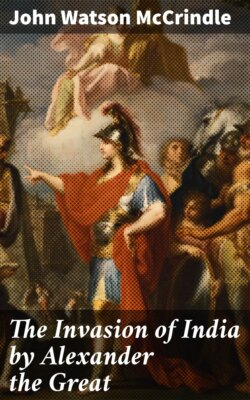Читать книгу The Invasion of India by Alexander the Great - John Watson McCrindle - Страница 8
На сайте Литреса книга снята с продажи.
Q. Curtius Rufus
ОглавлениеTable of Contents
Nothing is known with any certainty respecting either the life of this historian or the time at which he lived. Niebuhr makes him contemporary with Septimius Severus, but most critics with Vespasian. Zumpt again, who, like some other eminent scholars, identifies him with the rhetorician Q. Curtius Rufus, of whom Suetonius wrote a life now lost, places him as early as Augustus.[5] The style in which his history is written certainly shows him to have been a consummate master of rhetoric. He was particularly given to adorning his narrative with speeches and public harangues, and these, as Zumpt observes, are marked with a degree of power and effectiveness which scarcely anything in that species of writing can surpass. It may also be said that his style for elegance does not fall much short of the perfection of Cicero himself. It has of course its faults, and in these can be traced the incipient degeneracy of the Latin language, such as the introduction of poetical diction into prose, the ambition of expressing everything pointedly and strikingly, not to mention certain deviations from strict grammatical propriety.
The materials of his narrative were drawn chiefly from Ptolemy, who accompanied Alexander into India, from Kleitarchos their contemporary, and from Timagenes, who flourished in the reign of Augustus, and wrote an excellent history of Alexander and his successors. While the sources whence he derived his information were thus good on the whole, he was himself deficient in the knowledge of military tactics, geography, chronology, astronomy, and especially in historical criticism, and he is therefore as an historical authority far inferior to Arrian. But in perusing his “pictured pages” the reader takes but little note of his errors and inconsistencies, being fascinated with his graceful and glowing narrative, interspersed as it is with brilliant orations, sage maxims, sound moral reflections, vivid descriptions of life and manners, and beautiful estimates of character. It is not surprising that with such merits Curtius has been one of the most popular of the classical authors. In spite of all his sins, for which he has so often been pilloried by the censors of literary morals, his history of Alexander has been the delight and admiration of not a few of the greatest of European scholars. He seems to have taken Livy as his model, as Arrian took Xenophon for his. His work consisted originally of ten books, but the first two are lost, and in some of the others considerable gaps occur. The French translation of Curtius by Vaugelas, who devoted thirty years of his life to the task, is so remarkable for its elegance that it has been pronounced to be as inimitable as Alexander himself was invincible. It is not, however, a very close version.
